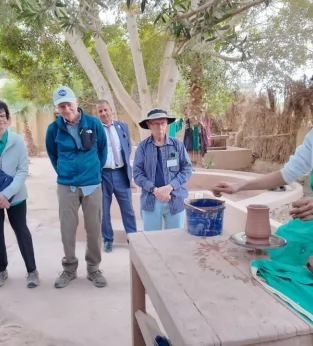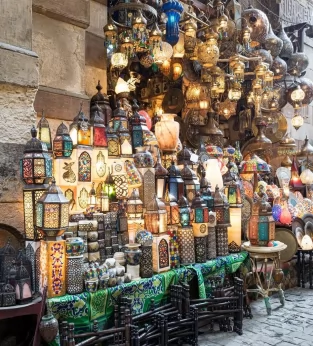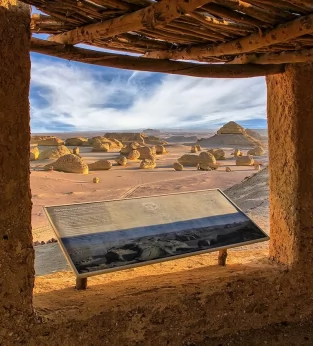Stay updated!
Welcome to Inside Egypt's luxury tours, featuring an immersive Aswan city tour that takes you through the heart of the Nubian village in Aswan, Egypt!
While in Aswan, you must meet representatives of the Nubian tribe for a unique cultural experience that offers insight into its rich heritage and traditions. During a visit to an Egyptian Nubian village, travelers can interact with locals, learn about Nubian customs and folklore, and gain insights into the local way of life. It's a chance to step away from the bustling tourist areas and discover the authentic charm of the Nubian people.
Prepare to embark on an extraordinary travel experience that goes beyond the ordinary. We aim to provide visitors with exceptional and high-quality journeys, allowing them to immerse themselves in the captivating charm of the Nubian culture and heritage.
What sets our luxury tours apart is our unwavering commitment to excellence. We meticulously curate every aspect of your journey to ensure you receive the finest services and experiences. From the moment you arrive, you will be greeted by our knowledgeable and courteous guides who will accompany you throughout your adventure.
As you explore the Nubian village in Aswan, you will discover a world rich in history, art, and vibrant traditions. Our expert guides will unveil the secrets of this ancient civilization, sharing captivating stories and insights that will deepen your understanding and appreciation of the Nubian culture.
We understand that luxury lies in the details, and that's why we have handpicked the best accommodations, ensuring your comfort and relaxation after each day of exploration in the Nubian village. Indulge in luxurious amenities, savor delectable local cuisine, and enjoy personalized services that cater to your every need.
Our luxury tours also offer exclusive access to hidden gems and off-the-beaten-path locations that are not easily accessible to regular travelers. Immerse yourself in the local way of life as you interact with friendly villagers, participate in traditional activities, and witness age-old customs that have been preserved for generations.
Whether you choose to sail along the Nile River on a private felucca boat or explore the village's vibrant markets, our luxury tours guarantee unforgettable moments and unique experiences that will stay with you long after your journey ends.
Inside Egypt's tours elevate travel to new heights, promising a truly remarkable adventure filled with opulence, cultural immersion, and cherished memories. Join us for an unparalleled exploration of this enchanting destination and let us create a travel experience that surpasses all expectations.
One of the highlights of our Egypt tour itineraries, such as the 17 Days in Egypt on a Long Nile Cruise, and the 14 Days in Egypt Tour (Around Egypt in 14 days) is a mesmerizing Nubian village tour in Aswan.
Don't miss this opportunity to embark on an extraordinary journey to the Nubian Village with Inside Egypt!
Photos of the Nubian Village in Aswan
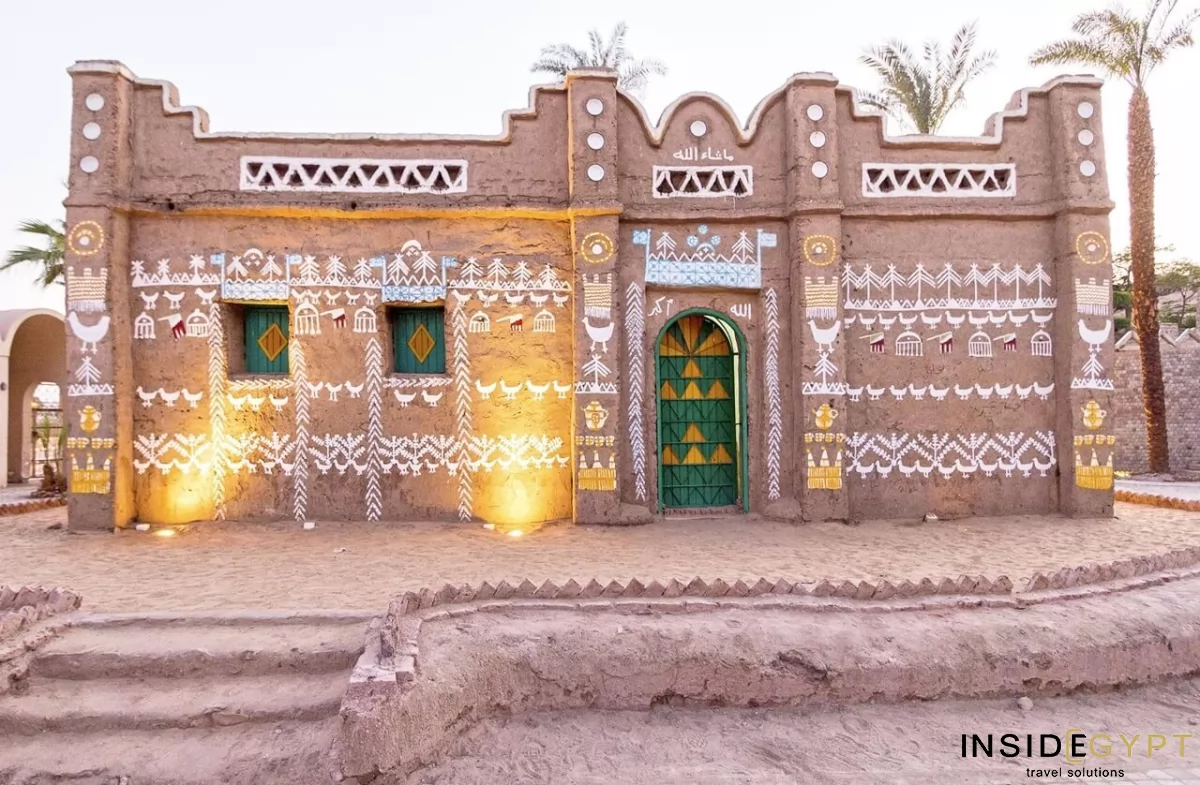
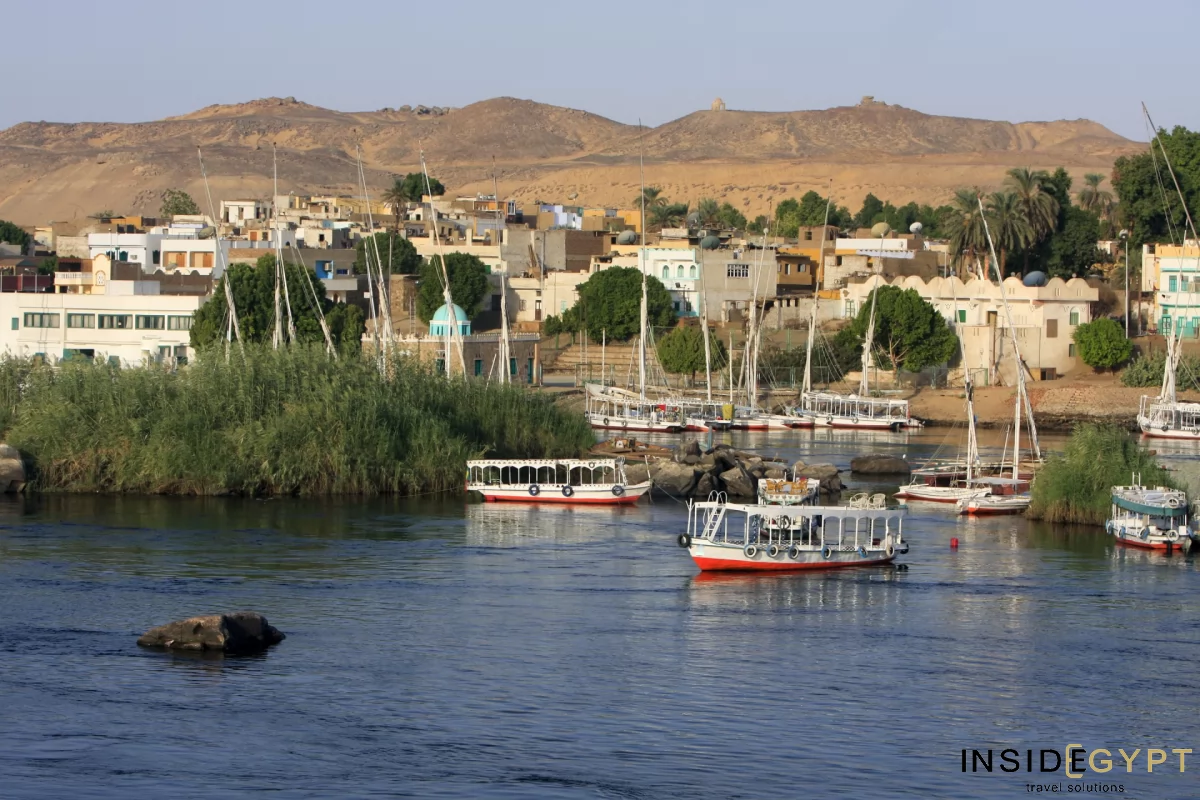
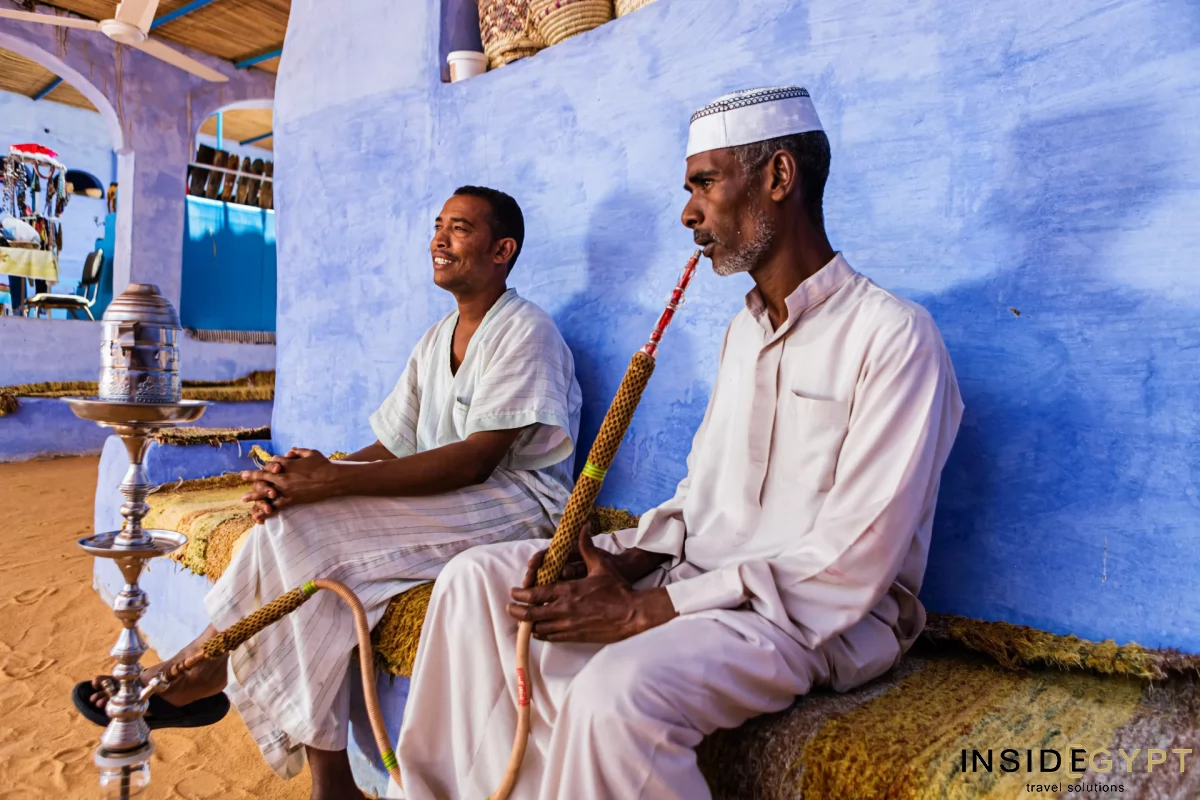
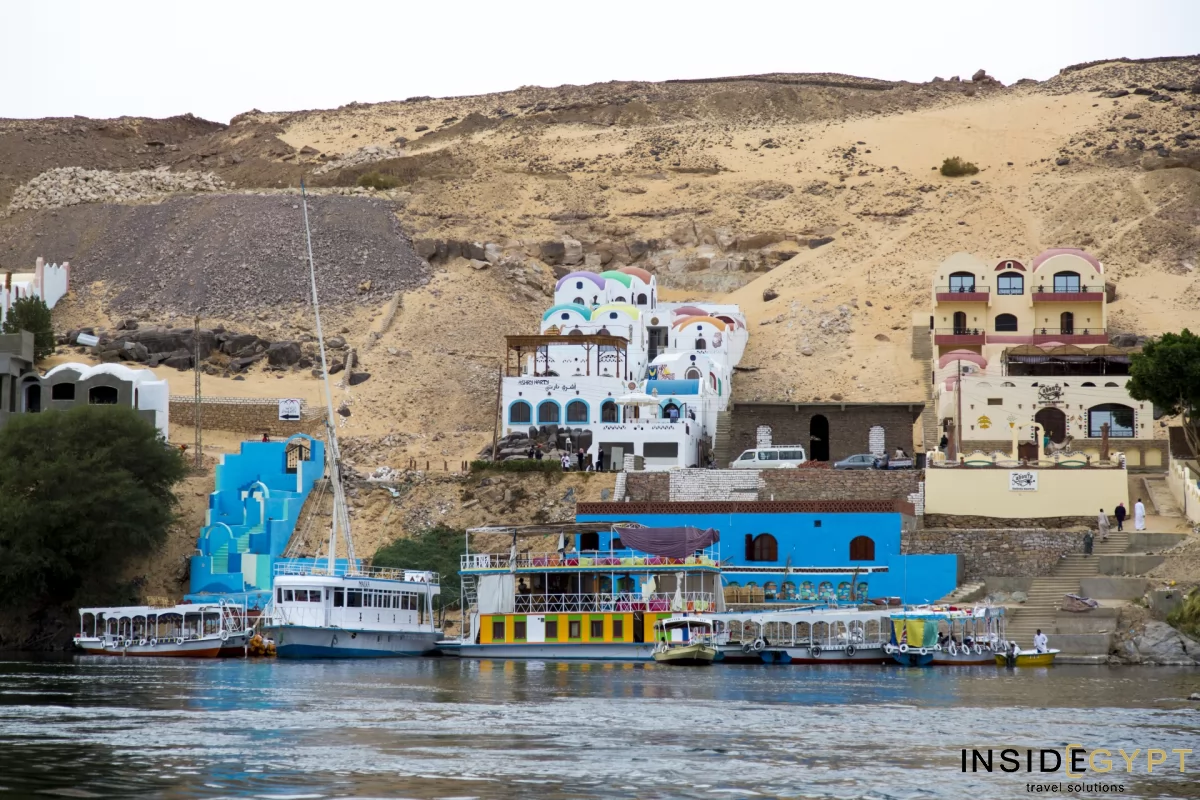
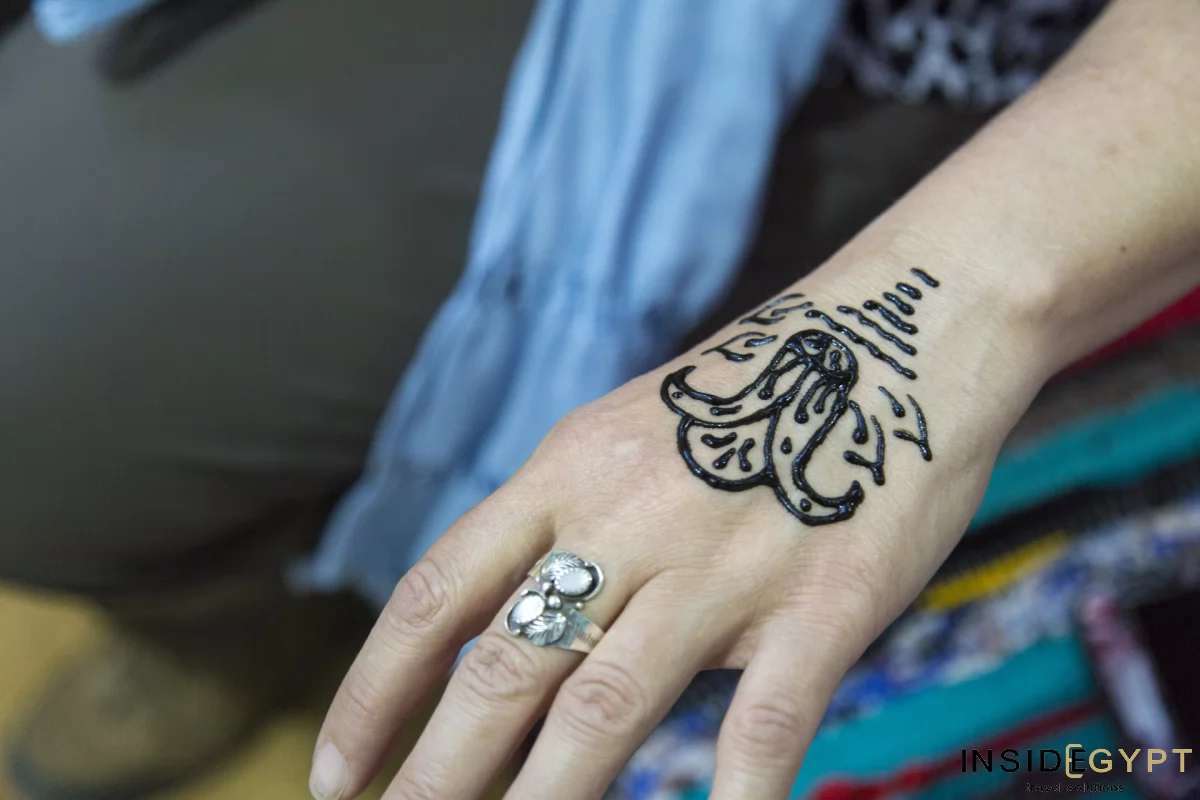
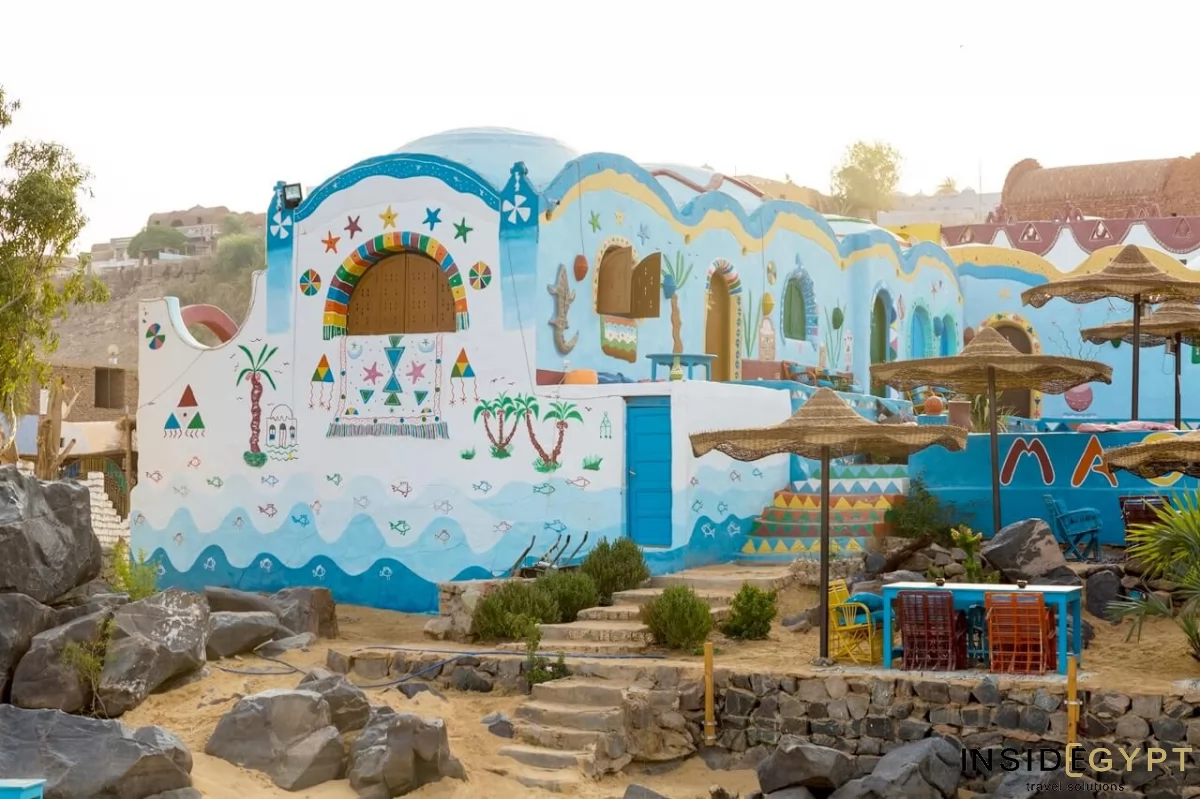
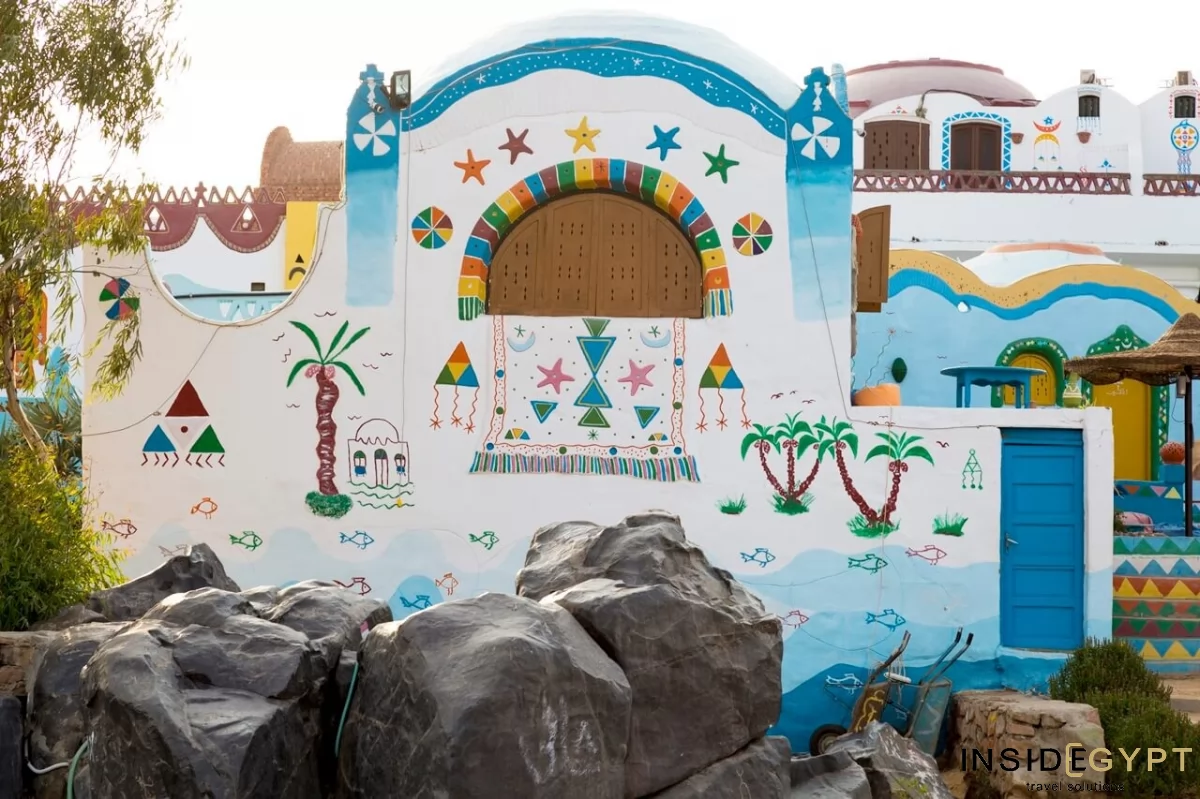
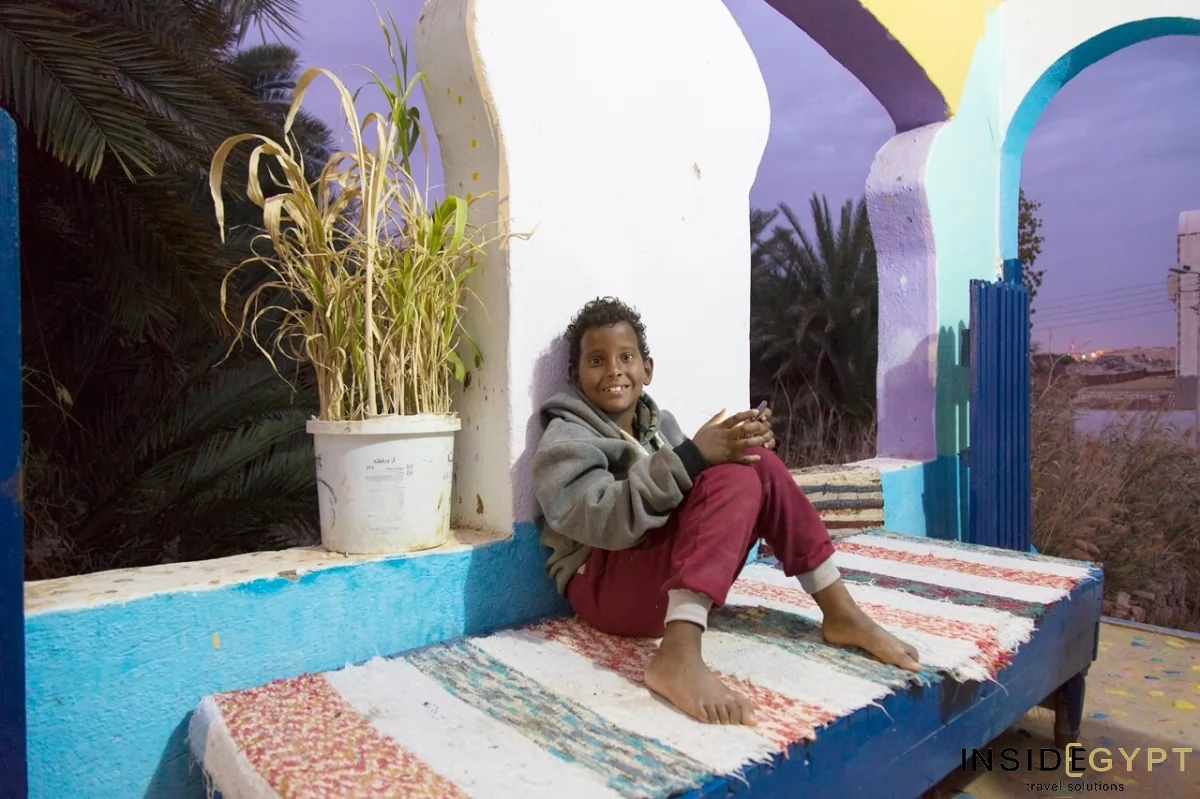
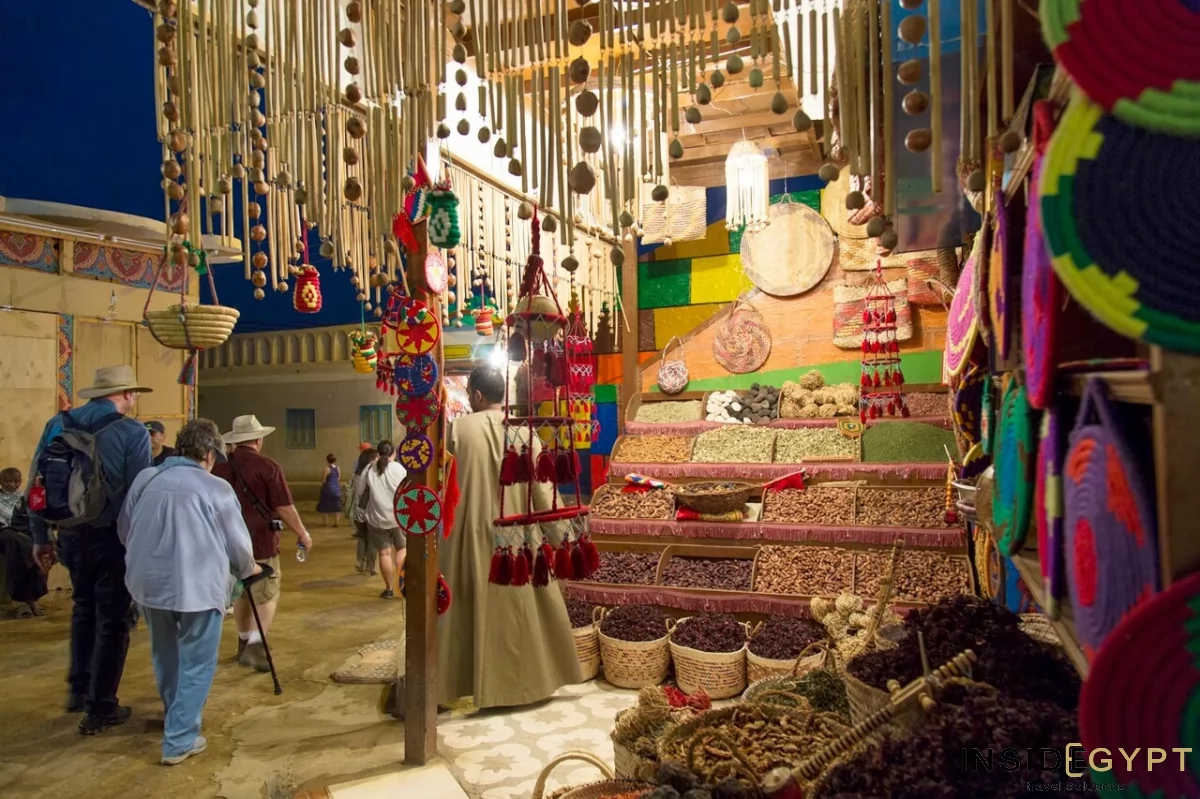
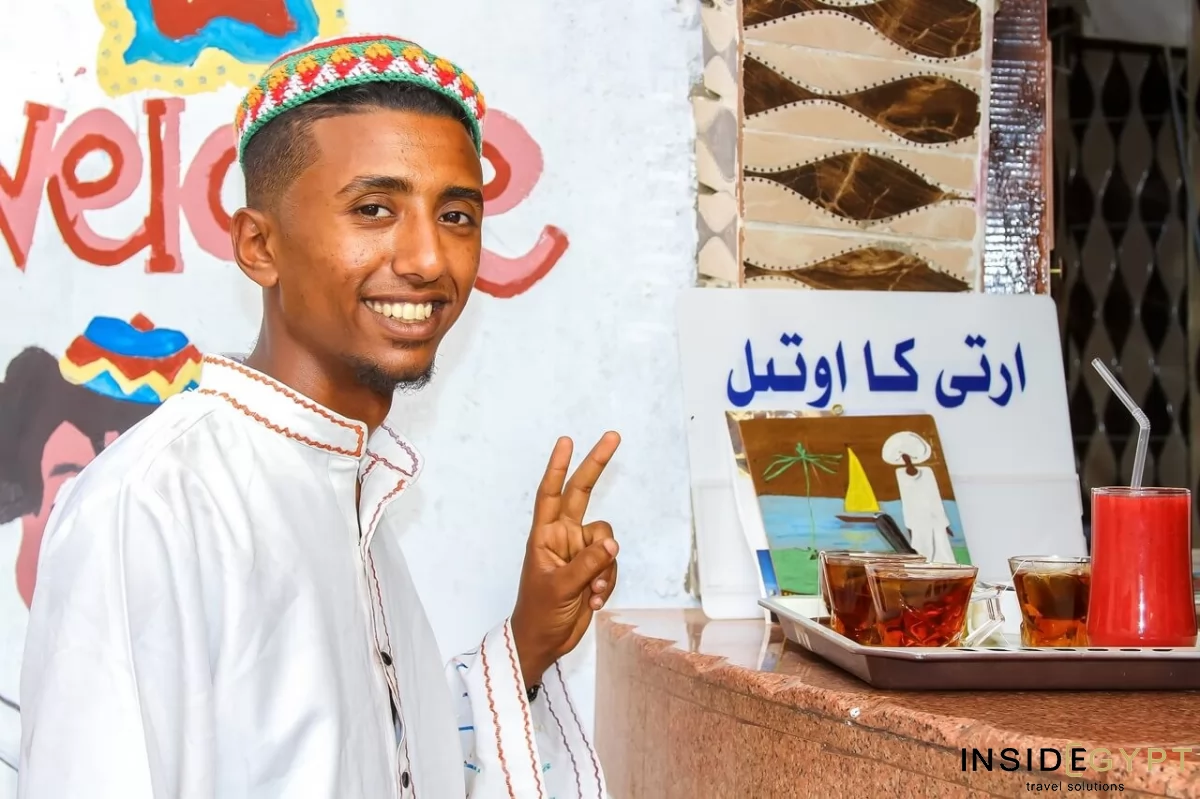
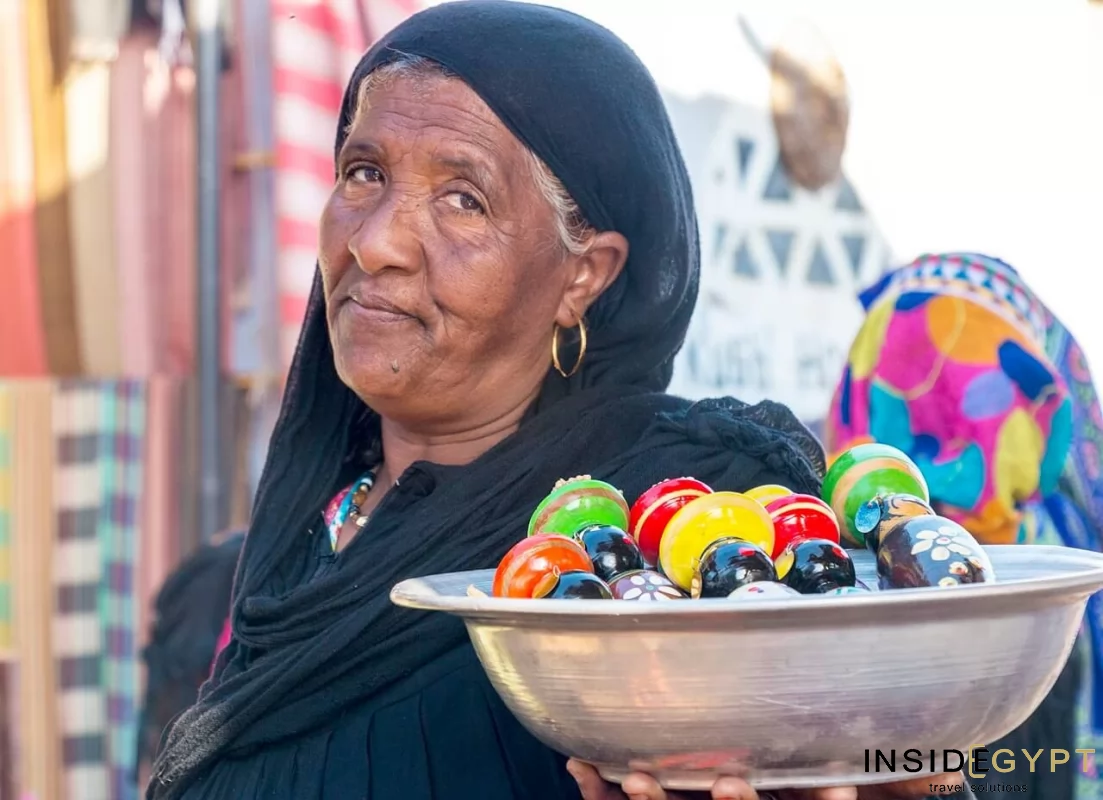
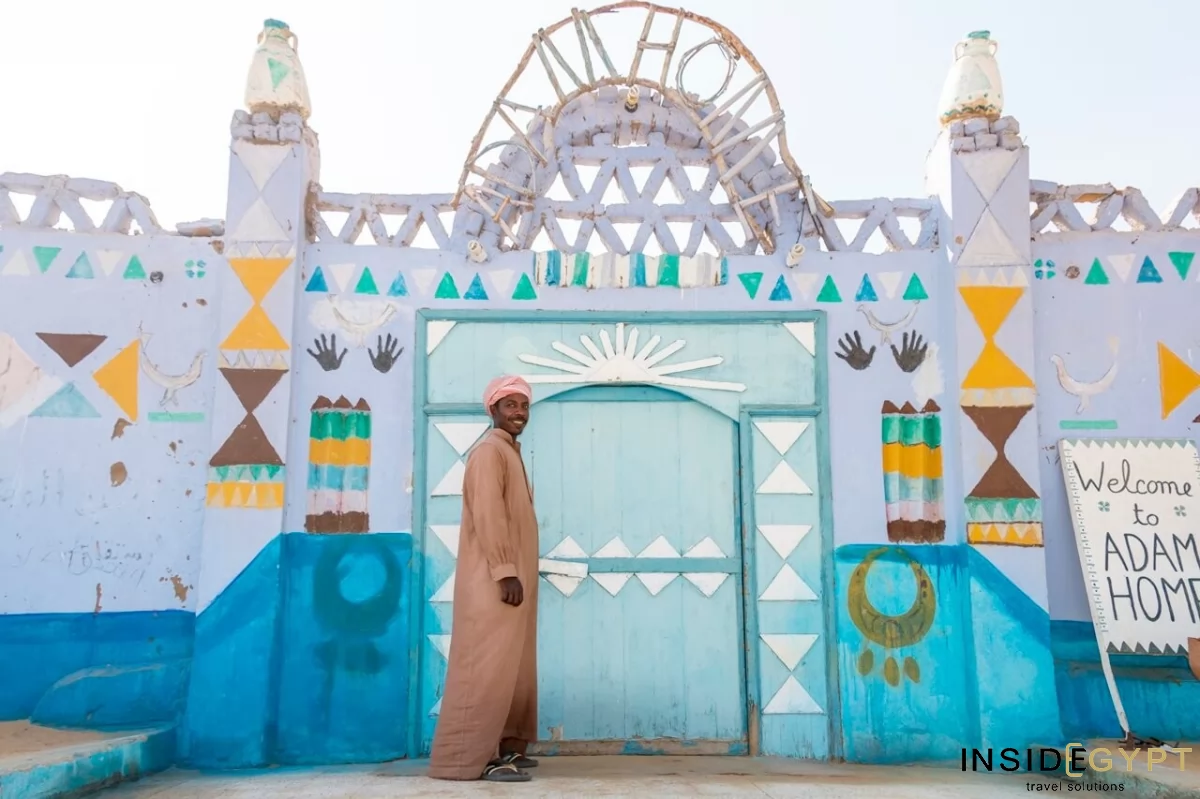
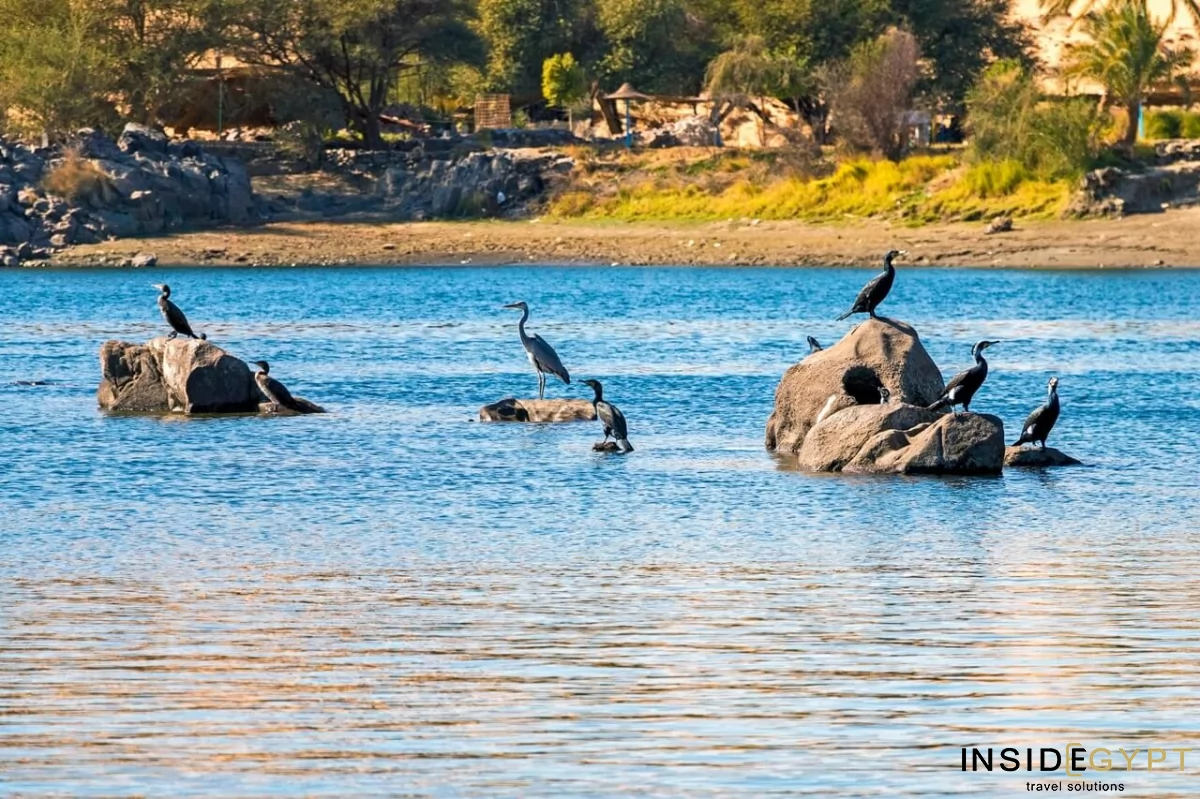
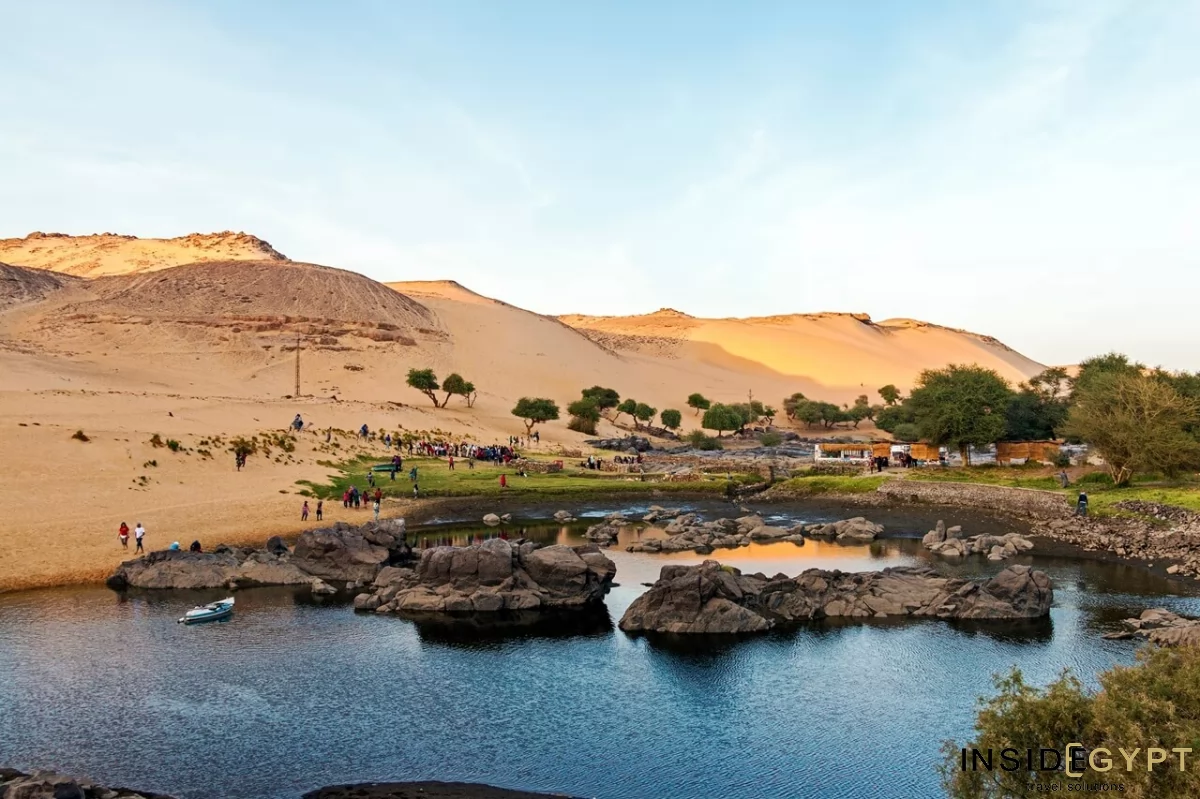
Discover Our Exclusive Egypt Tours
Tour Reviews
FAQ About the Nubian Village in Egypt
Who are the Nubians?
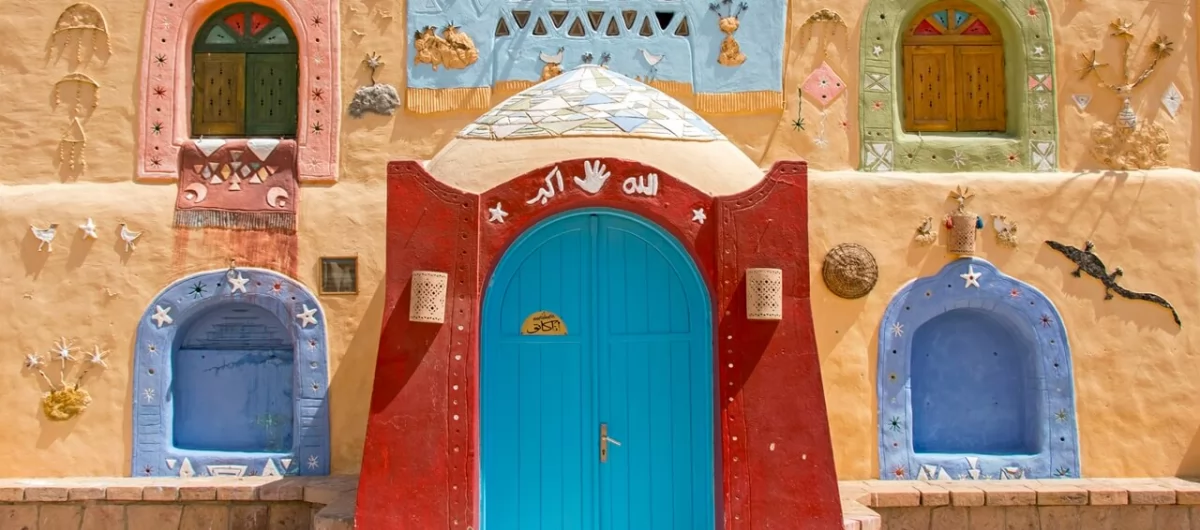
A visit to Aswan is a unique opportunity to learn the culture of the Nubians. They believe that they were the first human race to inhabit the earth. Many of their modern customs and traditions have ancient roots. The Nubians emphasize their origin from the rightful inhabitants of these lands, and not from the Arab invaders. The name "Nubia" in Egyptian means gold (nub). This area was the main source from which the Egyptians obtained this metal. Nubian warriors served in the Egyptian army, and their skills were highly appreciated by the Egyptian rulers.
The life of modern Nubians is inextricably linked with the construction of the Aswan dams. Although they helped to improve the Egyptian economy (normalization of the water level in the Nile, commissioning of a large hydropower plant), as a result of their construction, a reservoir was created, and Lake Nasser, whose waters flooded vast areas that belonged to the Nubians. Under an agreement with the Egyptian government, the Nubians were relocated to new territories, between Aswan (Egypt) and the Second Cataract on the Nile (Sudan). They then received money to rebuild 35,000 flooded homes.
Over the course of the year, new villages were established and each of them is different. You will not find two identical Nubian houses in any of them. They are built using a traditional technique that uses dried mud bricks. The roofs are vaulted with mud bricks, palm leaves and reeds. The main entrance is always facing the Nile and it leads to an open courtyard with interior spaces. Each house has a guest room with a separate entrance, so that guests feel at ease.
The eye is drawn to the unusual decoration of the colorful Nubian houses with frescoes depicting Fatima's hand or the eye of the prophet. Nubians believe that these symbols provide protection against evil forces. Other facades are decorated with floral motifs, and some with contemporary elements such as trains, planes, cars and ships. All this is in vivid and bright colors.
Nubians are divided into three ethnic groups. In the north there are the Kenzi people who speak Nubian, in the south there are Fadiga people who also use the Nubian language, and among them the Arabs (actually Nubians assimilated with the Arab population).
The Nubian language was formed in the 6th century and was based on the Coptic alphabet enriched with new characters, and typical Nubian sounds. In the thirteenth century, the Arabic language began to dominate the population that had begun to assimilate with the Arab invaders. Today, the Nubian language consists of many dialects. There are no grammatical rules.
Visit a Nubian village on our tailor-made tour! Book your luxury Egypt tour!
Where is Nubia located?
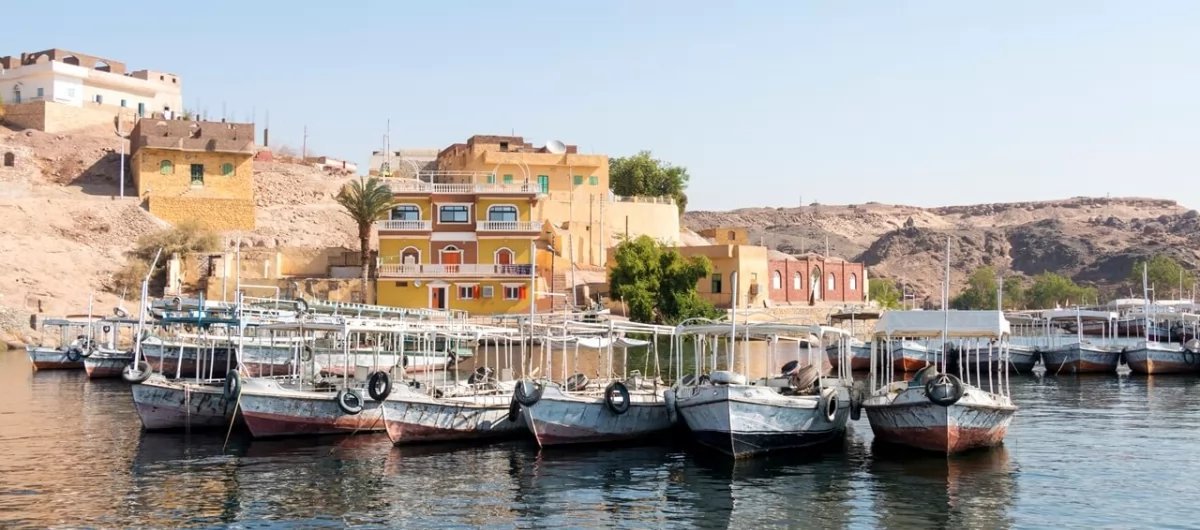
Nubia is a region located primarily in present-day southern Egypt and northern Sudan, along the Nile River. Historically, Nubia was a significant civilization with a rich cultural heritage. The region was known for its trade routes, natural resources, and architectural achievements.
In ancient times, Nubia was home to several powerful kingdoms, such as the Kingdom of Kush and the Kingdom of Meroë. These kingdoms played a crucial role in the trade between Egypt and other African regions, as well as the Mediterranean world. Nubia also had its own distinct culture and artistic traditions.
The significance of Nubia in a modern context lies in its historical and archaeological importance. The region is known for its ancient pyramids, temples, and other archaeological sites that provide insights into the ancient Nubian civilization. These sites attract tourists and researchers interested in exploring the history and culture of Nubia.
Regarding Nubia's relation to Aswan, Aswan is a city located in southern Egypt, just north of the Sudanese border. Aswan is an important gateway to Nubia, as it is the last major city in Egypt before entering the Nubian region. From Aswan, travelers can access Nubia by various means of transportation. One popular way to visit Nubian villages from Aswan is by taking a Nile River cruise. These cruises often include stops at significant Nubian sites, allowing tourists to explore the ancient ruins and experience the local culture. Another option is to take a guided tour or hire a private driver to visit specific Nubian villages and attractions.
In recent years, there has been an increased interest in cultural tourism to Nubia, with visitors seeking to learn about the indigenous Nubian people and their traditions. Settlements, such as the Nubian village near Aswan, offer an opportunity to experience Nubian hospitality, music, dance, and traditional crafts.
What is Nubian culture and the people of Aswan like?

Nubian culture is a vibrant and diverse cultural heritage that stems from the Nubian people, an ethnic group indigenous to the region of Nubia, which stretches along the Nile River in southern Egypt and northern Sudan. Aswan, located in southern Egypt, is home to a significant Nubian community. Nubian culture has a long and storied history dating back thousands of years. They have their own distinct language, known as Nubian, which belongs to the Nilo-Saharan language family. However, due to modern influences and interactions with neighboring populations, Arabic is widely spoken as well.
One of the defining features of Nubian culture is its strong connection to the Nile River. The Nile has played a vital role in shaping Nubian life, providing a source of livelihood through agriculture, fishing, and trade. The traditional Nubian villages of Aswan, such as Elephantine Island and Gharb Soheil, are situated along the banks of the Nile.
Nubian architecture is renowned for its unique style and vibrant colors. Houses in Nubian villages are often painted in bright hues, such as blue, yellow, and pink, adding a lively atmosphere to the surroundings. The distinctive Nubian houses are typically adorned with intricate geometric patterns and decorative motifs.
Music and dance are integral parts of Nubian culture. Traditional Nubian music is characterized by the use of instruments like the tambourine, flute, and oud (a stringed instrument similar to the lute). Dances are lively and energetic, often accompanied by rhythmic clapping and foot-stomping.
Nubian cuisine is flavorful and diverse, incorporating a variety of ingredients such as fish, meat, grains, vegetables, and spices. Staple foods include millet, sorghum, and wheat, while fish from the Nile is a common protein source. Traditional dishes like fatta (a meat and bread dish) and molokhia (a leafy green soup) are quite popular.
The Nubian people have a strong sense of community and hospitality. Family and social ties are highly valued, and visitors to Nubian villages are often welcomed with warmth and generosity. Nubians take pride in preserving their cultural traditions and passing them down through generations. In recent decades, the construction of the Aswan High Dam and subsequent flooding of Lake Nasser led to the displacement of many Nubian communities. However, efforts have been made to preserve Nubian heritage and culture. Some villages, such as the Nubian Museum in Aswan, serve as cultural centers and showcases for Nubian art, history, and traditions. Visiting Aswan and immersing oneself in the Nubian community offers a unique opportunity to experience the richness and beauty of Nubian culture firsthand. From exploring ancient archaeological sites to engaging with the friendly locals, Aswan provides a glimpse into the vibrant tapestry of Nubian traditions, customs, and daily life.
What is included in this Nubian village tour?
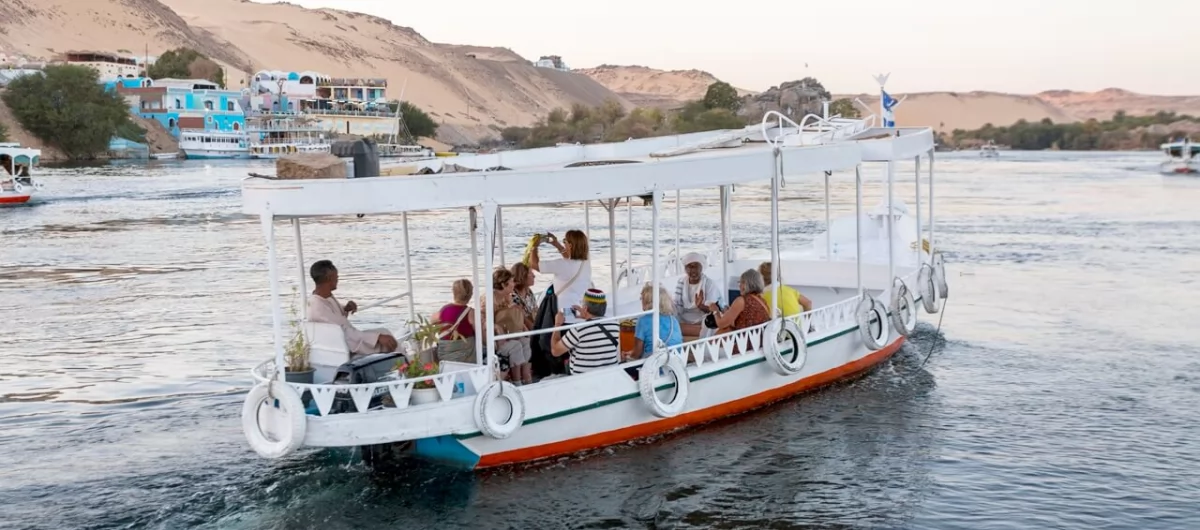
Inside Egypt's amazing tour of Nubian village in Aswan itinerary is as below:
The Egyptian Nubian village tour begins with a 35-minute motor boat ride heading to Gharb Suhail - Nubian Island, where the main Nubian village of Aswan is located. After reaching the destination, our guests will first visit the Nubian school. Here, you have the opportunity to interact with a Nubian Arabic teacher who will speak in detail about the Nubian culture and language. Guests will learn a little bit of the Arabic alphabet and even get to write their own full names in Arabic. The next destination on the Nubian village tour is a private house where tourists are welcomed with tea or a hot hibiscus drink. Our guests can enjoy authentic Nubian hospitality and take some pictures in the house. The Nubian houses are also home to crocodiles, providing a unique opportunity for our guests to interact with these fascinating creatures. As part of the Nubian cultural experience, a local women is present to create temporary tattoos on the hands of the female guests. This traditional practice adds an additional touch of authenticity to the tour. Next, guests will take a walk through the souq, the local market in the Nubian village. Here, guests can explore various shops and stalls that offer a wide range of Nubian cultural items. One highlight is the spice store, where guests can purchase spices, bags, and other products related to the Nubian culture.
Inside Egypt's Nubian village tour is also part of the Nile cruise. Throughout the cruise, guests will enjoy a 5-star luxury Nile cruise ship. The cruise provides a lavish and relaxing environment, with well-appointed cabins, elegant dining options, and world-class amenities. This ensures that our guests can unwind and enjoy the scenic beauty of the Nile River while experiencing the Nubian culture.
What People Have to Say About Our Nubian Village Tours

Our clients appreciate a visit to a Nubian village in Egypt and the opportunity to learn about Nubian culture. Before you visit, read the reviews of our clients:
What we would say is that the experience was quite amazing. It exceeded our expectations in every sense. We had never visited Egypt before but we did some research, and Inside Egypt's program really rose to the top, catching our eyes. Our overall experience was great and it was the best trip ever. The Egyptian sites we have visited were on our lists that we would like to visit. The cruise was great to travel along the Nile and experience that. We think that the most important thing is to hear the history of different parts of Egypt, different eras from the past and past history, going to the Nubian village of Aswan and seeing different parts. That was an extremely unique experience. We felt safe and we felt happy and secure, with the security around us. Egypt is an experience that you can't miss! The Inside Egypt team is very helpful and they care about everyone's special needs. This is a major plus.
SALLY & MICK
My favorite place to visit throughout my Egypt trip had to be the Nubian village of Aswan, and holding the baby crocodile. I have to admit at first I was afraid of them, but then I realized how cute and amazing these creatures are. I really enjoyed learning about the Aswan people and their culture and how the Nubian children go to school. Another site that was breathtaking was the Temple of Abu Simbel which was really nice, and of course I can't forget how amazing it was to be on a Nile cruise. It was so peaceful, and looking at the little sailboats from above was a really fun experience. Egypt is a really nice and safe country, and the weather was amazing this time of the year. I haven't felt unsafe for a single moment, and our tour guide made sure all of our needs were taken care of, and that we enjoyed every single moment during our trip. The hotels we stayed at were really comfortable and the beds were super soft. I had the best night's sleep on them. My brother found Inside Egypt through their website and convinced me, my mom and my sister-in-law to come and visit this beautiful and extravagant country. I'm hoping to bring my friends one day to make them live their dreams as Egypt is truly out of this world.
LYNN CRAWFORD
Other Sites Nearby
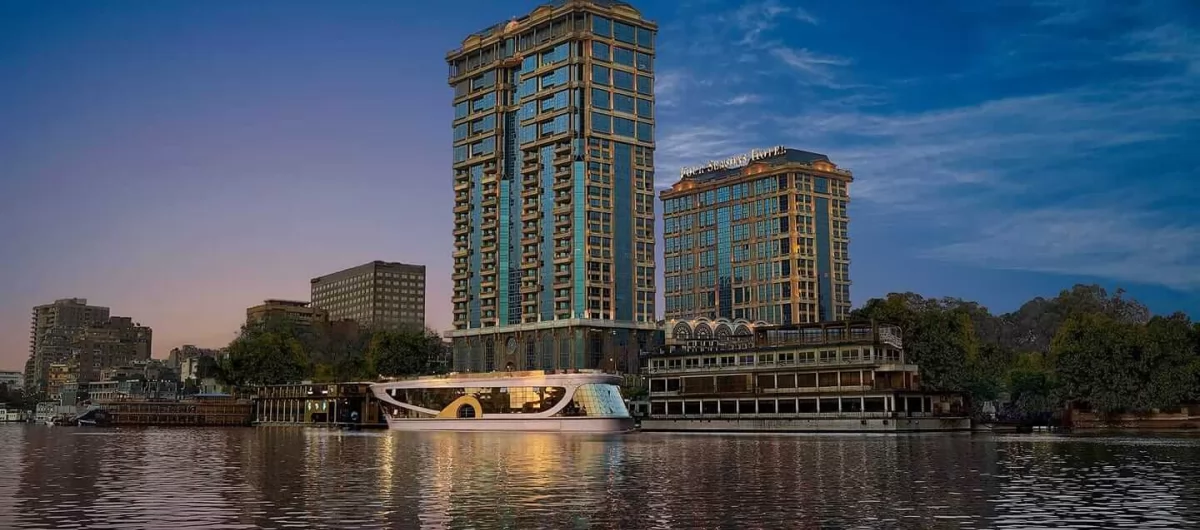
Near the Nubian village in Aswan are several fascinating sites that tourists should consider visiting during their stay. These destinations offer a rich historical and cultural experience, showcasing the region's ancient wonders. Here are three notable places to explore:
The Great Aswan Dam
The Great Aswan Dam is a remarkable engineering marvel situated on the Nile River.Completed in the 1970s, the dam provides hydroelectric power to Egypt, regulates the flow of the Nile, and helps control flooding. Visitors can witness the massive structure and learn about its significance to Egypt's economy and agriculture. The High Dam also offers panoramic views of Lake Nasser, a vast reservoir formed by the dam.
The Unfinished Obelisk
Located in a granite quarry, the Unfinished Obelisk is a colossal ancient monument that provides a unique glimpse into the construction techniques of ancient Egypt. Carved during the reign of Queen Hatshepsut, the obelisk would have been the largest ever created if completed. Visitors can marvel at its massive size, admire the intricate carvings, and learn about the ancient quarrying methods.
The Temple of the Goddess Isis on Aglika Island
Situated on Aglika Island (also known as Philae Island), the Temple of the Goddess Isis is a mesmerizing ancient complex dedicated to the worship of the goddess Isis. Accessible by a short boat ride, this temple is renowned for its stunning architecture, intricate reliefs, and its significance as one of the last temples built in the classical Egyptian style. Visitors can explore the various structures within the temple complex, including the Great Temple of Isis, the Kiosk of Trajan, and the Temple of Hathor.
Abu Simbel
Located about 280 kilometers south of Aswan, Abu Simbel is an iconic UNESCO World Heritage Site. The site comprises two massive rock temples built by Pharaoh Ramses II. The temples are famous for their colossal statues and intricate carvings, and they were also relocated to higher ground to avoid submersion when the Aswan High Dam was constructed.
Visiting these sites in the Aswan region is highly recommended for tourists seeking to immerse themselves in the rich history and cultural heritage of Egypt. These locations offer a perfect blend of architectural wonders, historical significance, and natural beauty, providing a comprehensive experience that showcases the uniqueness of Aswan.
